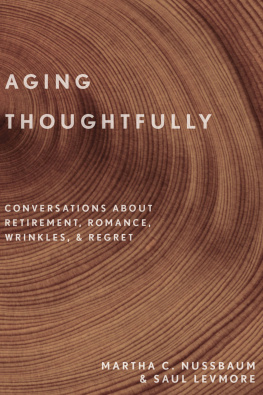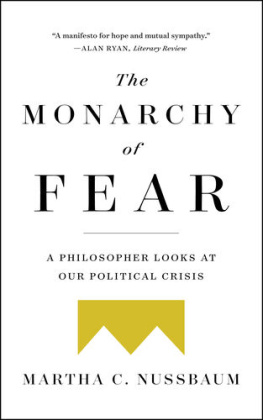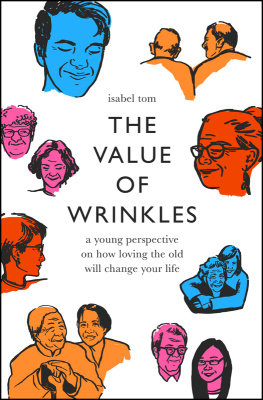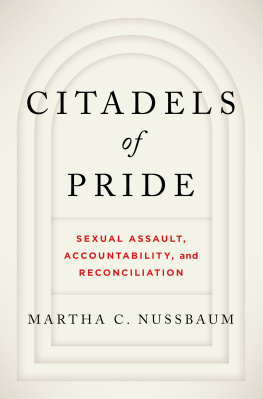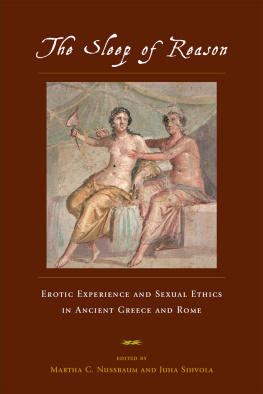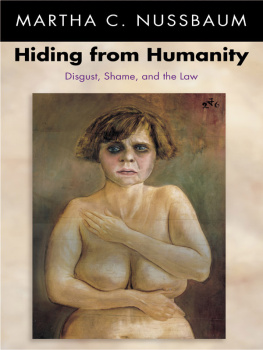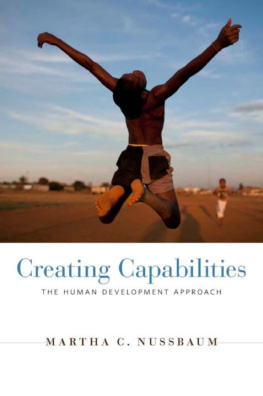Martha Craven Nussbaum - Aging thoughtfully : conversations about retirement, romance, wrinkles, and regret
Here you can read online Martha Craven Nussbaum - Aging thoughtfully : conversations about retirement, romance, wrinkles, and regret full text of the book (entire story) in english for free. Download pdf and epub, get meaning, cover and reviews about this ebook. year: 2017, genre: Home and family. Description of the work, (preface) as well as reviews are available. Best literature library LitArk.com created for fans of good reading and offers a wide selection of genres:
Romance novel
Science fiction
Adventure
Detective
Science
History
Home and family
Prose
Art
Politics
Computer
Non-fiction
Religion
Business
Children
Humor
Choose a favorite category and find really read worthwhile books. Enjoy immersion in the world of imagination, feel the emotions of the characters or learn something new for yourself, make an fascinating discovery.
- Book:Aging thoughtfully : conversations about retirement, romance, wrinkles, and regret
- Author:
- Genre:
- Year:2017
- Rating:3 / 5
- Favourites:Add to favourites
- Your mark:
- 60
- 1
- 2
- 3
- 4
- 5
Aging thoughtfully : conversations about retirement, romance, wrinkles, and regret: summary, description and annotation
We offer to read an annotation, description, summary or preface (depends on what the author of the book "Aging thoughtfully : conversations about retirement, romance, wrinkles, and regret" wrote himself). If you haven't found the necessary information about the book — write in the comments, we will try to find it.
Aging thoughtfully : conversations about retirement, romance, wrinkles, and regret — read online for free the complete book (whole text) full work
Below is the text of the book, divided by pages. System saving the place of the last page read, allows you to conveniently read the book "Aging thoughtfully : conversations about retirement, romance, wrinkles, and regret" online for free, without having to search again every time where you left off. Put a bookmark, and you can go to the page where you finished reading at any time.
Font size:
Interval:
Bookmark:


Oxford University Press is a department of the University of Oxford. It furthers the Universitys objective of excellence in research, scholarship, and education by publishing worldwide. Oxford is a registered trade mark of Oxford University Press in the UK and in certain other countries.
Published in the United States of America by Oxford University Press
198 Madison Avenue, New York, NY 10016, United States of America.
Martha C. Nussbaum and Saul Levmore 2017
All rights reserved. No part of this publication may be reproduced, stored in a retrieval system, or transmitted, in any form or by any means, without the prior permission in writing of Oxford University Press, or as expressly permitted by law, by license, or under terms agreed with the appropriate reproduction rights organization. Inquiries concerning reproduction outside the scope of the above should be sent to the Rights Department, Oxford University Press, at the address above.
You must not circulate this work in any other form and you must impose this same condition on any acquirer
CIP data is on file at the Library of Congress
ISBN 9780190600235
eISBN 9780190600259
To Rachel, Nathaniel, and Eliot
MARTHA
SAUL
SAUL
MARTHA
MARTHA
SAUL
SAUL
MARTHA
MARTHA
MARTHA
SAUL
SAUL
MARTHA
SAUL
MARTHA
WE WOULD LIKE, most of all, to thank the University of Chicago Law School for creating an ideal environment for work and for critical conversations that have helped us greatly. At the penultimate stage of the manuscripts development we were fortunate to have extensive written comments from Douglas Baird, William Birdthistle, and Emily Dupree, who generously poured over the entire book. For written comments on specific chapters we would like to thank Brian Leiter and Lior Strahilevitz. And we had expert research assistance from Emily Dupree, Nethanel Lipshitz, and Alex Weber.
THIS BOOK IS about living thoughtfully, and certainly not about dying, gracefully or otherwise. To age is to experience, to gain wisdom, to love and to lose, and to grow more comfortable in ones own skin, however much it might be loosening. Aging is many other things. For some people, it might be about regretting, worrying, hoarding, and needing. It can also be about volunteering, comprehending, guiding, rediscovering, forgiving, and, with increasing frequency, forgetting. For the financially fortunate, it can be about retiring and bequeathing and, in turn, saving and spending in the preceding years. Many of these tendencies also pertain to people who do not yet think of themselves as aging. But these young friends, relatives, and colleagues often regard their elders as storehouses of wisdom, as well as walking warnings. This quest, to find the good, or even just the wisdom, in the wrinkles, is at least as old as Cicero, whose work is as relevant in our fast-changing world as it was two thousand years ago.
If, unlike other species, we learn, record, and widely communicate our errors and successes, and do so in ways that have expanded the frontiers of the human experience and improved the lives of succeeding generations, then perhaps we can also expect progress in the personal realm. We have made advances in agriculture, manufacturing, and aviation. It is less clear that we have done so with respect to partnering, parenting, and choosing political leaders, and perhaps this is because the problems in these realms are moving targets that are not conquered over time through incremental scientific progress. Aging falls between these scientific and interpersonal challenges. On average we live longer and more comfortably than our predecessors. We have more choices, and this book is about these choices.
If we accept that aging is a time of life, then it follows that it is something we have in common. Each of us ages in his or her own way, but we can learn from others experiences. As people age, their interests, behaviors, and preferences may changeoften in ways that confirm the shared experience. As we age, are we more or less competitive? Spiritual? Frugal? Needy? Envious? Tolerant? Generous? We may need friends to help us recognize these changes, and to think through their desirability. When an isolated individual observes and contemplates, it is hard to discern whether one has become more self-absorbed, more accepting of criticism, more frightening to others, or more unreasonable in making demands on family members. Self-knowledge might therefore require friendships and conversations, and in this book we hope to set an example in this regard.
We offer different perspectives on topics related to aging, with the aim of continuing the conversation with each other and our readers. Some of our chapters are designed to help families have meaningful conversations about matters they ought to discuss before disability or death intervenes. We encourage thoughtfulness and communication about topics that are often regarded as awkward or private. Few people talk with outsiders about the problems they face in passing on property to their children, especially when children are in disparate financial circumstances, have been difficult, or are embedded in fractured families. Similarly, few people talk seriously about philosophical questions, such as the nature of ones longing for perpetual influence. Finally, most people are quite aware of physical changes as they age, and yet are uncomfortable talking about their bodies. This may have something to do with the nature of rekindled love and new romance among mature partners. We engage with such topics in these chapters. One of us approaches these topics as a philosopher and the other as a lawyer-economist inclined to think in terms of incentives, but we share a conviction that an academic perspective on these topics bears practical fruit.
Other topics are easy to broach, and for these we try to provide broad, philosophical, and policy-oriented perspectives. We talk about the all-too-common problem of wanting to manage things one cannot completely control, including other people. We see aging as a time of life, just like childhood, young adulthood, and middle age. It has its own puzzles in need of reflection. It has unique pleasures and joys, as well as pains. But, perhaps because people are disinclined to think of aging as an opportunity, few works of reflection treat the puzzles that belong to this time of life. Our goal is to investigate some of the complicated and fascinating questions that arise in this time of life; the questions are about living more than about ending.
The form of our book is inspired by Ciceros De Senectute (On Aging). Written in 45 b.c.e., the work is framed as a conversation with Ciceros best friend, Atticus, to whom he addressed thousands of surviving letters. The two were in their sixties, and Cicero, dedicating the work to Atticus in a preface, says that even though they are not all that old yet (Romans were a very healthy lot), they really ought to think ahead to what life has in store for them. The work is intended as a diversion, Cicero says, because both of them are worried about politics and about family issues.
Cicero invents a little dialogue in which a truly aged man, Cato, age eighty-three at the dramatic date of the dialoguehealthy, active, still a leader in politics, a famous host and friend, and an avid farmertalks to two men in their thirties who press him for information about that time of life. Since they have heard all sorts of negative things about aging, they would like to know how he would reply to some charges commonly made against that period of life: that it lacks creativity, that the body cant accomplish anything, that there is no pleasure, that death is a constant fearful presence. Even though young, they say, they know that they are heading to where Cato currently isif they are lucky enough to get thereand ask for his insiders view of their common destination. Cato happily accepts, because one of the great pleasures of age, he says, is conversation with younger people. Cicero, through his Cato, always has his eye on a larger audienceon conversation on many topics with readers of different ages, and, as it has turned out, in many different times and places.
Font size:
Interval:
Bookmark:
Similar books «Aging thoughtfully : conversations about retirement, romance, wrinkles, and regret»
Look at similar books to Aging thoughtfully : conversations about retirement, romance, wrinkles, and regret. We have selected literature similar in name and meaning in the hope of providing readers with more options to find new, interesting, not yet read works.
Discussion, reviews of the book Aging thoughtfully : conversations about retirement, romance, wrinkles, and regret and just readers' own opinions. Leave your comments, write what you think about the work, its meaning or the main characters. Specify what exactly you liked and what you didn't like, and why you think so.

